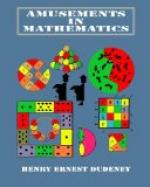18.—The market women.
A number of market women sold their various products at a certain price per pound (different in every case), and each received the same amount—2s. 21/2d. What is the greatest number of women there could have been? The price per pound in every case must be such as could be paid in current money.
19.—The new year’s Eve suppers.
The proprietor of a small London cafe has given me some interesting figures. He says that the ladies who come alone to his place for refreshment spend each on an average eighteenpence, that the unaccompanied men spend half a crown each, and that when a gentleman brings in a lady he spends half a guinea. On New Year’s Eve he supplied suppers to twenty-five persons, and took five pounds in all. Now, assuming his averages to have held good in every case, how was his company made up on that occasion? Of course, only single gentlemen, single ladies, and pairs (a lady and gentleman) can be supposed to have been present, as we are not considering larger parties.
20.—Beef and sausages.
“A neighbour of mine,” said Aunt Jane, “bought a certain quantity of beef at two shillings a pound, and the same quantity of sausages at eighteenpence a pound. I pointed out to her that if she had divided the same money equally between beef and sausages she would have gained two pounds in the total weight. Can you tell me exactly how much she spent?”
“Of course, it is no business of mine,” said Mrs. Sunniborne; “but a lady who could pay such prices must be somewhat inexperienced in domestic economy.”
“I quite agree, my dear,” Aunt Jane replied, “but you see that is not the precise point under discussion, any more than the name and morals of the tradesman.”
21.—A deal in apples.
I paid a man a shilling for some apples, but they were so small that I made him throw in two extra apples. I find that made them cost just a penny a dozen less than the first price he asked. How many apples did I get for my shilling?
22.—A deal in eggs.
A man went recently into a dairyman’s shop to buy eggs. He wanted them of various qualities. The salesman had new-laid eggs at the high price of fivepence each, fresh eggs at one penny each, eggs at a halfpenny each, and eggs for electioneering purposes at a greatly reduced figure, but as there was no election on at the time the buyer had no use for the last. However, he bought some of each of the three other kinds and obtained exactly one hundred eggs for eight and fourpence. Now, as he brought away exactly the same number of eggs of two of the three qualities, it is an interesting puzzle to determine just how many he bought at each price.
23.—The Christmas-boxes.
Some years ago a man told me he had spent one hundred English silver coins in Christmas-boxes, giving every person the same amount, and it cost him exactly L1, 10s. 1d. Can you tell just how many persons received the present, and how he could have managed the distribution? That odd penny looks queer, but it is all right.




